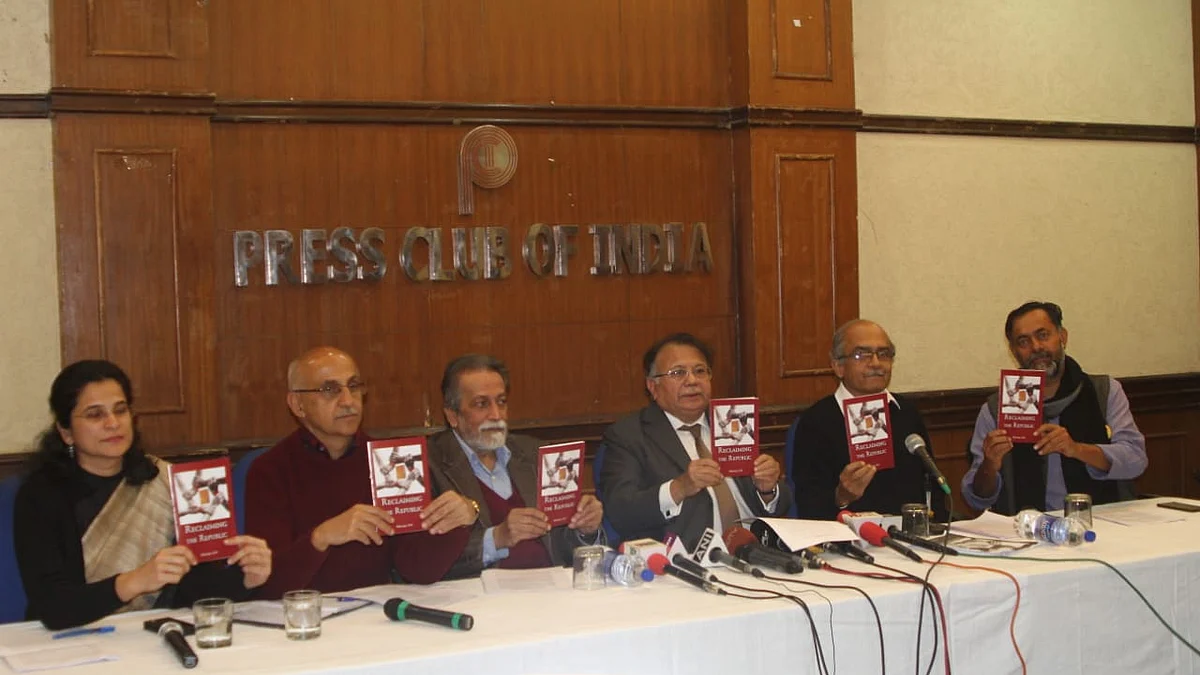India
Justice AP Shah-led panel puts forth ‘people’s agenda’ to parties to consider
Justice AP Shah along with Prashant Bhushan, Yogendra Yadav and many others are demanding urgent reforms in law, policies and institutions and have released a document “Reclaiming the Republic’’

What do you do when the politicians you elect don’t do their job? What do you do when the discourse is only about vendetta and not about improving the democratic processes in the country? What do you do when several politicians want to aid the rich and not lift the poor? That is when concerned citizens come together to ensure that the institutional pillars of democracy are not dismantled.
Several citizens by led Justice AP Shah have come together to demand urgent reforms in law, policies and institutions and to undo the damages done by the current ruling establishment. Justice AP Shah, Prashant Bhushan, Harsh Mander, Prabhat Patnaik, Anjali Bhardwaj, Syeda Hameed and Yogendra Yadav released a document titled ‘Reclaiming the Republic’ at New Delhi.
Published: undefined
The reforms cover a range of issues such as public accountability and participation, judicial reforms, electoral reforms, media reforms, among others. Several of the measures are for empowering citizens to hold the government accountable and to ensure meaningful participation in governance.
Calling it the 19-point agenda for 2019, members of ‘Reclaiming the Republic’ have put forth these demands:
1) Doing away with antiquated and draconian laws that have been widely misused to curtail personal liberties and intimidate political activists
2) Electoral reforms aimed at reducing the influence of money power in elections and making the electoral system more democratic
3) Media reforms aimed at making the media freer, more diverse and accountable through an independent regulator
4) Universal basic services and social security for all citizens
5) A “new deal” for the farmers comprising assured income, freedom from indebtedness and sustainable farm practices
6) Turning Right to Education into a reality
7) Well endowed, regulated and autonomous higher educational institutions
8) Affordable and accessible health care for all through public health delivery system
9) Extension and expansion of MNREGA to guarantee to every adult at least 150 days of work a year at minimum wages
10) All vacancies must be filled in education, health and other essential public services
11) Additional expenditure on these to be met by active fiscal strategy for raising resources
12) An independent and empowered Environment Commission to lay down environmental standards and regulations and ensure their compliance
13) Assure minimum critical presence of women in decision making
14) Enact a comprehensive anti-discrimination law
15) Special programmes for most vulnerable social groups
16) Repair the damage done to anti-corruption laws and institutions
17) Strengthen accountability and transparency
18) Making the judiciary more independent, efficient, transparent, representative and accountable
19) Police reforms fully in accordance with the seven directions of the Supreme Court in the Prakash Singh case
As is normal when such pro-people agenda is put forth, the questions of monetary allocation and budget rise fast and furiously. Economist Prabhat Patnaik, who was one of those who released the agenda, said, “We have examined the costs involved in providing for such welfare measures. The cost of these welfare measures come up to only 5% of the GDP. These can be mobilised with the help of wealth tax, inheritance tax, corporate turnover tax, direct taxation and also by doing away the irrational corporate subsidies.
Realising that putting forth such an agenda is only one part of the job, they have also called several political parties for a meeting to discuss this agenda on February 8 to ensure inclusion of several of these policies for the 2019 Lok Sabha polls. Congress, NCP, RJD and Samajwadi Party have confirmed their participation.
Published: undefined
Follow us on: Facebook, Twitter, Google News, Instagram
Join our official telegram channel (@nationalherald) and stay updated with the latest headlines
Published: undefined